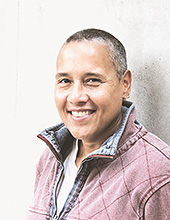c:o/re Senior Fellow 01/22 − 06/22

Catharina Landström is Associate Professor in the Science Technology, Society (STS) Division at Chalmers University of Technology in Gothenburg, Sweden. Before this she was Senior Researcher at the School of Geography and the Environment at the University of Oxford. At Oxford, she contributed to a science studies perspective on computer simulations and modeling of water challenges, such as flooding, drought and water quality, in transdisciplinary research projects. Working together with colleagues in the natural sciences and environmental engineering, she has engaged with local water management actors and co-created new approaches in participatory environmental computer simulation modelling. Landström has also been involved with developing participatory modelling approaches for use in the local management of water-related risks.
Translating Environmental Computer Simulation Modeling in Science to Decision Support Tools
Computer modelling has become widely used in the environmental sciences, the possibility to simulate changes in complex systems it offers has greatly extended the range of questions open to scientific investigation. The adoption of computer simulation modelling in environmental science is also a forceful driver for the introduction of model-based knowledge and tools in environmental decision making. In this project I will examine how environmental scientists present computer simulation modelling for use in environmental decision making. How do they argue for the validity, relevance and reliability of knowledge and tools generated by computer simulation modelling in the presentations of these to environmental decision makers?
Touching upon STS debates on open science this project will explore the ways in which environmental scientists and engineers envisage the societal use of knowledge, data and tools derived from computational research. Empirically the project relies on documentary analysis of texts presenting decision support tools and data platforms to readers in environmental decision making. Working with published texts allows for in-depth critical questioning, for example, about the limited uptake of the decision support tools produced by computational environmental science. Among modellers this remains puzzling as it appears obvious to them that these tools are intrinsically useful. Research funding agencies approach the problem as a failure to connect and require that project bids include stakeholder engagement. Critical interpretation of multiple ways of promoting and presenting decision support tools and data for use by actors in society makes it possible to probe deeper. In the six-months of research allocated to this project I intend to draft a journal article for submission and to contribute to a longer-term research project on open science in society pursued together with a PhD student at Chalmers.
Publications (Selection)
Landström, Catharina. 2020. Environmental Participation. Practices engaging the public with science and governance. London: Palgrave MacMillan.
Landström, Catharina, Becker, Matilda, Odoni, Nicoloas, Whatmore, Sarah J. 2019. “Community modelling: A technique for enhancing local capacity to engage with flood risk management.” In Environmental Science and Policy, 92: pp. 255-26118
Landström, Catharina. 2017. Transdisciplinary Environmental Research: A Practical Approach. London: Palgrave MacMillan.
Landström, Catharina and Whatmore, Sarah. J. 2014. “Virtually expert: Modes of environmental computer simulation modeling.” In Science in Context, 27(4): pp.579-603.
Landström, Catharina, Whatmore, Sarah. J., Lane, Stuart. N. 2011. “Virtual Engineering: computer simulation modelling for flood risk management in England.” In Science Studies, 24(2): pp. 3-22

